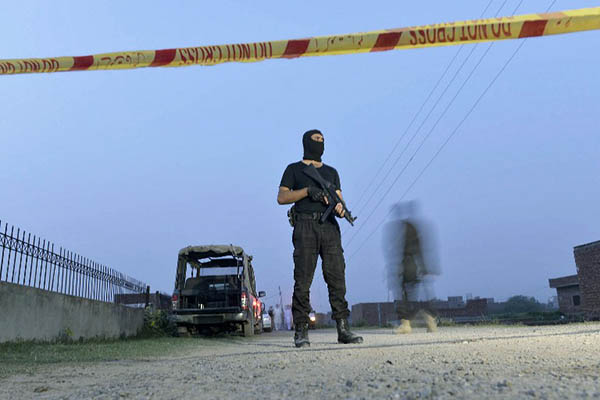
File Photo. Arif Ali—AFP
Most police officials do not have the training for planning or conducting raids in remote, rural areas.
By all indications the operation in the katcha area of the Indus River near Rajanpur is not going well. The islet in the Indus, long a sanctuary of criminal gangs and smugglers and by fresh accounts a hideout for some terrorist groups, is a tricky affair.
Into this has been thrust police contingents with one Elite unit, a Rangers platoon and some elements of the Punjab counterterrorism department. The results, reports suggest, aren’t particularly encouraging.
To be precise, the islet will be reclaimed. But that is not the point. The point is, how was the operation planned, if at all.
This area, as also the hills that abut the Punjab-Balochistan border and go further into Balochistan, has seen criminal activity for a long time. It has long been what is referred to as a ‘no-go area’ for the police. In other words, the gangs here are entrenched, know the terrain extremely well, are well supplied and, as happens in such circumstances, rely on kinship bonds and other local support, including for logistics.
After the horrific attack in Lahore’s Gulshan-e Iqbal Park, we see sudden activity: intelligence raids in cities, people being rounded up, renewed assertions to root out terrorism in all shapes and forms, the whole enchilada that we are now all too familiar with.
At some point during this newfound vigor, the Punjab government also woke up to the katcha gangs. Since it is loathe to getting Rangers in, it decides to send in the police. The police, correctly assessing the situation after initial probes, tried to requisition a couple of helicopter gunships which could reconnoiter and pound targets on the islet, making it easier for raiding units to make bridgeheads, consolidate and advance inwards. That hasn’t happened. There’s a sense that the Army wants the police to fail because once that happens, the Punjab government will have no option but to turn to the Army. That’s when the required equipment will come in. (In fact, fresh reports suggest the police has now asked for Army’s help.)
Be that as it may, the criticism of the police is largely unfounded and betrays a lack of understanding of police training.
Leaving aside for a while the police elite units, the standard police elements and their officers have no training for planning and conducting such raids. Even elite units for the most part are trained to operate in urban environment, in built-up areas. Riverine battles requiring some degree of amphibious fighting capabilities or raiding a large area to capture and hold ground, are way beyond the capacity of police units, not just here but everywhere.
The standard cop we see holding an SMG [general nomenclature for Type-56 assault rifle] might not have fired the weapon for years. Recently, Lahore police opened its short firing range for policemen. They fire 5 rounds at the range because of paucity of ammunition. Shooting skills require firing thousands of rounds of ammo in different positions, both static and moving—from basic static shooting to combat shooting. The average policeman has no such capability. He is worse with a pistol, which, incidentally, should be the standard weapon.
The elite personnel are better trained but most lose their edge because they are not employed for what they are trained, getting rusty doing guard duties with VVIPs.
The police doesn’t have any aerial platforms. It doesn’t have specialized SWAT units that can be called upon. It lacks the capacity for gathering field intelligence, especially in the case of the area they are raiding and failing.
Ground intelligence is gold. It is knowledge. Knowledge is power. If you know where your adversary is, how he is configured, what weapons he possesses, how he plans to employ his firepower, how long will his supplies last, what are his lines of communication et cetera, you get an edge over him. That knowledge is used in and for making your plan. And a fighting plan must put the adversary at a disadvantage. If you end up in a fair fight, you are stupid. If you end up being upstaged, you are stupider.
The government in Lahore has no idea what it is doing or what it is asking for. It has taken a political decision and it has pushed the police in and instructed it to go in hot and quick. Result: casualties and failure.
It’s the job of the commander, in this case the IGP, to read out to the chief minister The Charge of the Light Brigade. He should tell the C.M. that neither his men nor his officers are trained for tactics and fieldcraft. You don’t send a hockey team to a cricket world cup. [NB: though in our case I am not sure if the hockey team would have done any worse.]
But that’s not going to happen. No one wants to say it as is. The best the police have are a few Rangers mortars. Mortar is a great weapon if used effectively. I am not sure, though, how effective they are if they are being used blindly.
Ceteris paribus, therefore, I think a better option for the police would be to hermetically seal all access to the area and wait it out. The islet, as I said, will ultimately be reclaimed but the cost in men must be worked out. Men shouldn’t be sacrificed for the idiocies of politicians and officers.
Haider is editor of national-security affairs at Capital TV. He was a Ford Scholar at the Program in Arms Control, Disarmament and International Security at the University of Illinois at Urbana-Champaign and a Visiting Fellow at the Brookings Institution, Washington, D.C. He tweets @ejazhaider
The opinions expressed in this column are the author’s own and do not necessarily reflect, in part or whole, those held by Newsweek Pakistan.
